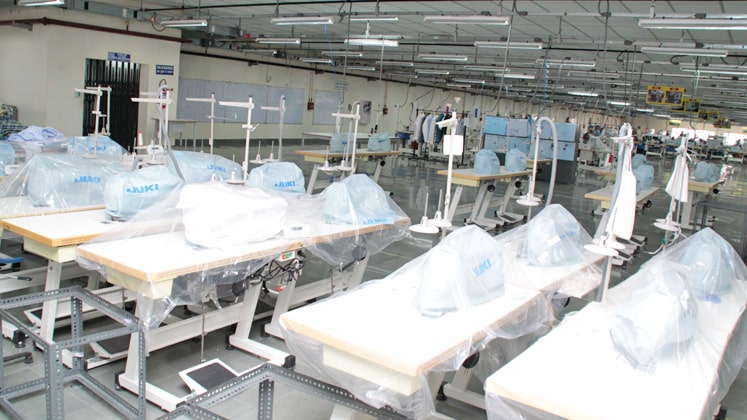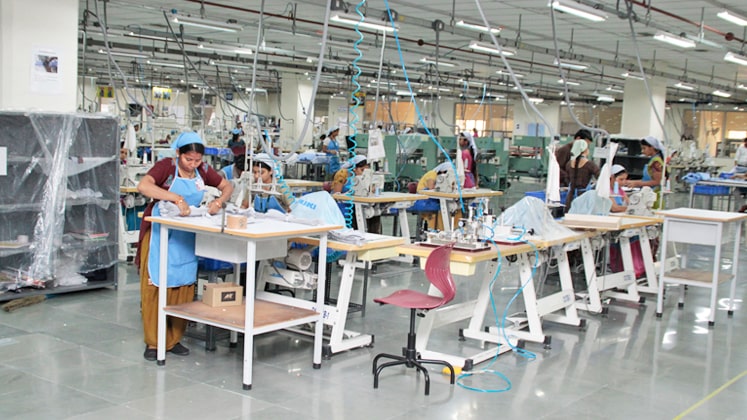
Growth is life! This simple strategy of business is a source of motivation and driving factor for entrepreneurs. But the dwindling Indian textile and apparel industry, especially exports, is forcing companies to rework on their expansion plans — which are being announced on public platforms after a lot of brainstorming. Apparel Resources identified around 75* companies from across India which announced to expand in the last three years, and tried to figure out the status of these announcements. Have they invested and how supportive has the Government been in this regard? How expansion has helped them in their growth? If they have not expanded, what has stopped them? These questions become more relevant as these companies include giant to medium-level manufacturers, and the scale of announced investment varies from Rs. 1 crore to Rs. 100 crore. Even more important than these figures has been the number of expected job generations; over 70,000 job creations were promised by these companies.
At a time when foreign giants like Epic, Youngone and Brandix are investing in India, what is keeping Indian players from coming forward as compared to overseas companies? Many organisations confirmed that neither they have expanded nor are they planning to expand in the near future. On the other side, few fulfilled their commitment and are confidently moving forward.
Announced and executed
Investor summit of various states and specific conclaves are some of the major platforms where especially big and medium-level companies make announcements regarding investment. In October 2017 during the foundation laying ceremony of Kakatiya Mega Textile Park (KMTP), Telangana signed MoUs with 21 companies, out of which, some are well-known apparel exporters like Gokaldas Images, Shahi Exports, Jaycot Industries and GK Threads.
In Apparel & Textile Conclave, Ludhiana, organised by Punjab Government, in July 2018, five textile and apparel companies signed MoUs and claimed a total proposed investment of Rs. 230 crore as well as proposed employment for more than 3,000 people.
With an aim to avail the benefit of lucrative policies and to become cost-effective, few companies opted to move to states like Jharkhand as in June 2018, almost 40 apparel manufacturing companies including well-known giants Shahi Exports, Arvind Ltd. Pearl Global, Matrix Clothing announced to start their operations there. The total announced investment was Rs. 2,500 crore.
Orient Craft, Gurgaon completed its huge unit of 2,000 machines in Ranchi. Kishor Exports, Agra has also started its production. Pee Empro Exports, Faridabad announced to invest Rs. 20 crore in July 2016, and recently PMS Uppal, MD of the company informed Apparel Resources that 500 workers have already been hired so far, and the entire project will be completed in June 2020. In Jaipur, The Choice Fashions also added a factory of 160 stitching machines with allied infrastructure a year ago and created a total of 300 jobs.
Ferro Sona Garments, Ludhiana has planned to invest Rs. 10 crore and create 250 jobs. The company installed 150 stitching and 15 circular knitting machines in the expansion phase. The only support it got was from the bank loan. Jivan Sharma, Manager of the company informed, “We have to continue our plan as we have good demand, so we did it. But overall, our experience has not remained positive. We could not get support regarding change of land use (CLU) and subsidy on electricity usage.”
These are few companies whose expansion projects are in pipeline and the production will start in the initial months of 2020.
Motivation behind expansion?

Apart from special package announced by the Union Government in 2016, lucrative policies of states, adding new buyers as well as orders increasing from existing buyers, and businesses shifting towards India due to US-China trade war are some of the common reasons why companies are expanding. On the other hand, as managing business is an individual choice, some companies see it from a different perspective. “We have to fight the challenges. We can either see the problem or the opportunities. Fortunately, at Pee Empro Exports, we only see opportunities. And if there is an issue, we have a good team of intelligent people to find a solution for that. We train our people to only work towards solutions,” said PMS Uppal.
Expansion contributing to growth
Some of the stalwarts in the textile and apparel industry often say in seminars and conferences that expansion is the only way to survive. Few companies which have either completed or are soon to complete the expansion project are growing well, expecting good growth. For instance, Pee Empro Exports, having a turnover of Rs. 350 crore, is expecting to take it up to Rs. 550 crore in the next two years. Orient Craft’s third unit is also under progress in Jharkhand. Around 500 differently-abled people will be employed in the upcoming unit that took two years to get completed. The Choice Fashions, which witnessed a growth of 25 and 29 per cent in the last two fiscal years, is expecting growth of 17 per cent in current fiscal. Ferro Sona Garments, which has completed expansion, is witnessing 30 per cent growth and is expecting to double its business in coming years.
On the other hand, companies that could not expand accept that whatever growth they projected has been definitely impacted. Rajesh Gupta, Mount Meru Industries, believes had his plan been executed on time, the company would have witnessed better growth.
Recently announced expansions
All said and done, various companies continue to announce investments and it will be interesting to see how they proceed in future. To mention a few, three months back, Richa Global Exports, Gurgaon, announced to invest Rs. 30-50 crore in Madhya Pradesh. The company recently started operations of its new unit, particularly for woven garments, situated at Manesar (Haryana).
Having fabric production facility in MP and garment factory in Noida, Maral Overseas Ltd. is also coming up with its garmenting unit in next one year, which will create job opportunities for 1,200 individuals. The company has already purchased land in Smart Industrial Park, Natrip, which is 50 km away from its fabric facility.
Business plans that could not take off
Improper implementation of policies is a big issue. Despite being the need of the business and even after proper planning and announcement of investment on the public platform, there are many cases where nothing materialised. And that too, when the scale of proposed investments was quite high as the majority of Indian companies doesn’t prefer to invest much in a single unit.
Naresh Joshi, Partner, First Reliable Industries, had earlier announced the investment of Rs. 50 crore in a technical textile unit and proposed employment generation for 200 people. But in his discussion with Apparel Resources, he shared that he has now decided to opt for Gujarat as he is not happy with the policy implementation in Punjab. “We have two projects. After kicking off the first one, we decided to shift focus from Punjab as we didn’t receive benefits that were committed to us.” He revealed that while the State’s portion in GST and duty on electricity were key benefits promised to the company, those have not been delivered yet.
Another similar case from Punjab is that of Mount Meru Industries which has also put its project on hold due to poor execution of State policies. Rajesh Gupta, MD of the company is unhappy with the way officials are working there. “I strongly feel that there is no clarity on policies and things depend mainly on officials rather than on systematic working. And there is no deadline for them.” Though Rajesh still hopes that things will improve, and so, he has not yet decided to shift his expansion plans to any other state. The company was supposed to invest Rs. 10 crore and create opportunities for 105 individuals.
Thus overall, conditions are becoming more challenging and seem impossible to work out due to poor implementation and down-market sentiment. Policies, not only of a particular state, but also of the Union Government, could not have much positive impact, at least with regard to fresh investment by apparel exporters.
Ashok Rajani – former Chairman, AEPC and present MD, Midas Touch, Mumbai – who announced to invest heavily, told Apparel Resources that they could not go ahead. He shared that market sentiments were also worst in 2016 as EU was already down and the US faced several store closures and negative development. “The situation has still not improved, and one can see month to month comparison of apparel export as it is falling down,” mentioned Ashok, further adding that the execution of this package also took much time.

An almost similar opinion was echoed by a few other apparel manufacturers who are primarily producing for export. Though they upgraded themselves with automation, they remained unsuccessful as far as expansion and fresh job creations are concerned. Animesh Saxena, MD, Neetee Clothing, Gurgaon, informed, “We invested in automation and sustainable initiatives like monitoring system, laundry and finishing which helped us to become more competitive. As far as fresh capacity enhancement or new job creation is concerned, we could not do so majorly due to negative business sentiments.” Even in future, at least in next one year, there is no indication for further expansion as Animesh believes that there is no clarity on policies and many overseas buyers are also not sure about their growth. “It’s time to consolidate and hold on,” he said.
Naveen Advani, Director, The Choice Fashions, Jaipur, who did not even apply for benefits of Amended Technology Upgradation Fund Scheme (ATUFS), added an interesting point here, “As far as ATUFS is concerned, rules are very much stringent and we have seen huge projects pending due to this. But we have to look at the positive side and can’t iterate that there’s no business. Business is always there in the market and we have to approach differently.” The company is now focusing on the domestic market and has good clients.
Business plans forced to take a back step
Some of the companies have had such a negative experience about Ranchi that they are on the verge of winding up their operations there. Akriti Apparels, Faridabad, installed around 80 stitching machines in the city and continued operations for eight months. But as subsidies were not released, the company could not continue there, despite having strong plans to expand further. Avanish Chander Jain, Director of the company informed, “Though productivity was very low in Ranchi, due to low wages, we were around 25 to 30 per cent cost-effective compared to our production in Faridabad. But we were not able to liaison with officials and failed to get subsidies.”
It is pertinent to mention here that Avanish had plans to shift maximum stitching operations from Faridabad to Ranchi, but negative experience forced him to continue in Faridabad. “It affected our growth opportunities in a major way. If we were able to continue in Ranchi, we may have added a few more clients just because of cost competitiveness,” he shared. When asked about his opinion on how other apparel manufacturers could continue in Ranchi, he maintained, “I can’t say anything, but for us, it was extremely difficult. We don’t believe in unethical practices.”

Some of the apparel manufacturers are in the process to set up their unit or start production there, as their training centres are already working there and creating a pool of trained operators. One such manufacturer is the Noida-based well-known apparel exporter Meenu Creation. So far, the company has invested around Rs. 1.5 crore and it will take around two months to start initial production there. Anil Peshawari, MD of the company shared, “Though we have not come to the stage of receiving subsidy as of now, I have heard that there are ‘issues’ regarding receiving subsidies.”
Cotton Blossom, Tirupur, is also in the process to start its unit of 400 machines in Jharkhand and the production is expected to start soon. “In general, releasing subsidies for garment exporters is overall a difficult process,” said Milton Ambrose John, MD of the company.
Subsidies are really important for the majority of apparel manufacturers, as starting a unit 1,000 kilometres away from existing operations is not easy. Especially this is the first kind of experience for them, and the apparel manufacturing industry lacks dedicated professionals at the top level who can manage a unit independently. Not only that, creating a complete ecosystem – be it easy availability of raw material, mid-level management or allied support – is equally important. For example, despite having ample labour and lucrative policies, Bihar could not attract apparel manufacturers from other states while Ludhiana-based companies have aggressive planning in this regard.
*Many companies didn’t reply on e-mail while few were unavailable for comments.






